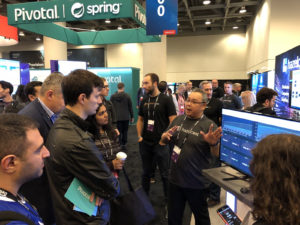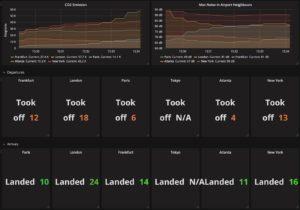Hazelcast Expands Technical and Business Conversation at Oracle Code One
Hazelcast just came off three very busy days at Oracle Code One, which was the developer focused sub-event from Oracle Open World. In spite of (or perhaps because of) Oracle’s pivot from Java-centric to a more polyglot developer focus the attendance was significant.

The key takeaways for this year’s event were:
Compared to previous years, the audience was the same on one level, but different on others. The first day there seemed to be a fair number of DBAs (not surprising at an Oracle event, but not expected at a developer-focused Oracle event), and of course there was still a significant presence of developers, but with a broader focus than Java – which would be consistent with Oracle’s expanding focus. There was a lot of interest in how Hazelcast works in an Oracle environment and we had put together an elegant demo of Hazelcast in the Oracle Cloud specifically for this event. There was also a lot of interest in Hazelcast Jet, which would be consistent with the overall growth of data streaming across nearly every industry Hazelcast serves. This would also explain why most of the people we spoke with seemed very interested with the idea of reducing load on backend databases and stored procedures.
 Compared to some of the shows where Hazelcast participates (which have an IMDG focus) this event was broader in its reach, and as a result the conversations were generally longer and more varied. There were a lot of senior and mid-level systems architects in attendance, and our story seemed to resonate strongly. All of them were familiar with caching technologies and spent a lot of time drilling into competitive differentiators.
Compared to some of the shows where Hazelcast participates (which have an IMDG focus) this event was broader in its reach, and as a result the conversations were generally longer and more varied. There were a lot of senior and mid-level systems architects in attendance, and our story seemed to resonate strongly. All of them were familiar with caching technologies and spent a lot of time drilling into competitive differentiators.
In spite of the broader focus, the majority of the people we spoke with (particularly developers) were already familiar with Hazelcast or were active users. For that group that was not familiar with Hazelcast, two minutes into the demo you could literally see the light bulb going off above their heads. This happened a lot with the telemetry demo we ran for our Hazelcast Jet product.
Developers who had not heard of Hazelcast listened politely until they found out they could build a cluster in under four minutes, then we suddenly had their full and undivided attention. Most of the developers were experienced (mid- to senior-level) and seemed to focus on the simplicity of setting up and integrating Hazelcast into their existing apps.

As the show progressed the mix of attendees expanded from developers all the way up to CTOs. There was also a lot of curiosity about how Hazelcast is different from Redis. The best example of the difference in focus between Hazelcast and Redis is that they were not at the show.
Security was a significant conversational driver – as it usually is – and we had a not-surprising high level of interest in our Hazelcast Cloud offer (currently in beta) across a broad spectrum of user types. Cloud will always be front-and-center technology, and with the pending release of Hazelcast Cloud we can offer our customers another robust, viable alternative.
One final take away from the event was a perspective that surfaced several times when speaking with developers. The basic comment was essentially “I really enjoy my job, and Hazelcast is great to work with, but I’d love to know the bigger picture of what we’re doing and how it fits into what our customers are trying to accomplish.” Hazelcast has historically had a strong connection with the developer community, which has always been focused on the nuts and bolts of how products and services are put together. That focus will continue and will in fact expand, but at the same time we are broadening our scope to raise awareness at the strategic and line-of-business levels on the impact of our technology and what it can enable. The developer community has done some amazing things with Hazelcast, which are resulting in genuinely disruptive business drivers. We are going to drive hard to surface the business value-add of Hazelcast and hopefully provide the developer community the broader context to their efforts.
